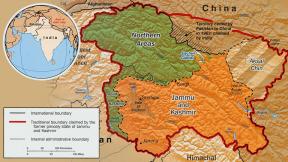
“And the likeness of those who spend their wealth in search of Allah's pleasure, and for the strengthening of their souls, is as the likeness of a garden on a height. The rainstorm smiteth it and it bringeth forth its fruit twofold. And if the rainstorm smite it not, then the shower. Allah is Seer of what ye do” (Quran 2:265).
Abu Huraira reported that a man asked the messenger of Allah (SAW) about what charity is rewarded most. The messenger of Allah (SAW) said what translated means:
"(The charity that is most rewarded is) To give when you are healthy, anxious to accumulate money, afraid of poverty and hoping for wealth, not waiting until you are on your death bed to say: give this (money) to so and so and this to so and so and this person had that. " -Al-Bukhari
Muslims in North America and abroad have regularly heeded Allah and the Prophet Muhammad (peace and blessings be upon him)'s instructions to give charity.
Whether it's in Palestine, Iraq, Afghnistan, Burma, Syria,, Bangladesh, or Kashmir, they have donated generously abroad and to Muslim relief organizations in the U.S. to alleviate the suffering of fellow Muslims in the wake of wars, oppression and natural disasters.
Most of these organizations do an excellent job of collecting money and making sure it gets to where they've promised it will. They have also been successful in providing necessary relief and services on the ground in countries where it is needed.
As well, there have been Muslim relief workers who have been killed in the line of duty, especially where there was or is war taking place.
Yet, despite the success and trustworthiness of the majority, you may come across one rotten exception: the “relief” organization which successfully raises funds and then suddenly disappears without a trace with donors' money.
One such Muslim “relief organization” existed a few years ago in Lansing, Michigan. It successfully raised a substantial amount of money from donors and vanished.
There are things you can do to make sure you are not cheated out of helping your brothers and sisters in need by verifying if you are giving to your donation a legitimate charitable organization. Here are some guidelines you can use:
Question, question, question!
Don't assume if someone is claiming to be a “Muslim relief organization” that they are one, especially if you have never heard of them before. And make sure you have the name of the charity right: some organizations name themselves after well-known charities or with a similar name to get more donations.
Ask them the following questions:
1. What is their mailing address and telephone number?
2. What percentage is the administrative cost.
This will give you an understanding of how much this organization spends on administrative costs.
All charitable organizations have administrative costs. But the problem comes when too much of the donated money is spent covering this expense instead of the organization's programs and activities to help those it is supposed to.
If you notice that too much of the money is spent on administrative costs, ask why this is so. If you are not satisfied with the answer or don't get a clear, straightforward one, don't give a donation through this organization.
3. Are professional solicitors hired to raise funds?
If this is the case, then what percentage of the donations collected do they receive for their work?
4. Is your donation tax deductible?
5. How long has the organization been in operation?
6. Who is running the organization?
Who is the president and who sits on its governing board as well as its advisory board? If the person is unknown, this needs some checking with reputable Islamic organizations or trusted Muslims.
7. Is there a third party which audits the organization?
8. What is their tax exempt number?
Ask for documents
You can also ask for certain kinds of documents which organizations have to provide to assess the legitimacy of this organization. Some examples are:
a. A copy of their annual report.
This outlines exactly what an organization does, its programs, activities, information about its governing body, its structure and financial position as well as its financial activities over the last year.
Right off the bat, an illegitimate organization will in most cases not be able to provide you with this information or will not want to do this.
If this is a legitimate relief agency, getting this and other documents (see next point) gives you an idea of exactly what they do and how they allot money for various projects, for example.
b. Copies of complete yearly financial statements.
These statements provide a more precise picture of the organization's financial position and activities. It includes an auditor's or a treasurer's report.
c. Ask for an IRS Form 990
This gives an exact description of a charity group's expenses and costs.
Tax Exempt is not Tax Deductible
An organization may tell you they are tax exempt. This is not the same as being tax deductible.
Tax exempt means the group is not required to pay taxes while tax deductible indicates a person donating money to this organization will be able to deduct his or her donation to them on his or her federal income tax return.
If you want to check up on an organization's tax status, or want more information about tax exemptions and deductions, contact your local IRS (Internal Revenue Service) office.
Keep an exact record of which organizations you have donated to and records of your donations (receipts, canceled checks and bank statements) so you can document your charitable giving at tax time.
Never write a check in someone's name
If you decide to go forward and give a donation, NEVER write out a check in the name of a particular individual. Make sure to put it in the name of the organization otherwise you are, essentially, handing over your money to someone you know next to nothing about and who could steal it.
Never give cash over the phone
If someone calls claiming to represent a Muslim charitable organization and asks for donations in cash only, do not follow through with a donation.
Fraud individuals or organizations may ask for cash only because by doing this there is no written documentation that can be traced back to the organization or individual who is trying to cheat others. Using cash only means they can take the money and run, and probably never get caught by the appropriate authorities.
You should always give donations, if you feel an organization is trustworthy, by check.
If you do give cash, make sure to get some kind of written receipt or record
It is not uncommon to find in mosques, for example, people soliciting funds for various causes by passing a box around and asking for cash.
This does not necessarily imply they are dishonest. But a more effective way of doing this is for the mosque in which the money is being collected to deposit the total funds in its bank account, and then issue the individual collecting on behalf of a given cause a check. This keeps a written record of where the money went, and individual Muslims can also ask for a copy of this.
Never give your credit card number over the phone
Check out the organization with its mailing address
If someone asking for a donation from the organization or written information about it gives you a P.O. Box mailing address to send donations to, the post office where this mailbox is located can tell you the name and address of the person who rented this postal box.
This is another way to make sure this organization is legitimate
Give preference to locally-based relief groups
If there is a Muslim relief organization which has an office already established in the country they are aiming to help, give them preference over other organizations.
Don't be bullied
If you are being asked to donate in a bullying, aggressive manner, do not give to this organization.
If you discover fraud
If you discover, after investigation and consultation with other trustworthy Muslims that there is an organization cheating others, you can contact the following agencies:
a. The Philanthropic Advisory Service
Council of Better Business Bureaus
4200 Wilson Blvd., Arlington, VA 22203
b. your local branch of the Better Business Bureau
c. The National Charities Information Bureau
19 Union Square West, New York, NY 10003
Photo Attribution: http://commons.wikimedia.org/wiki/File:Distributing_food_staples_to_drought_affected_communities_(10692888224).jpg








Add new comment